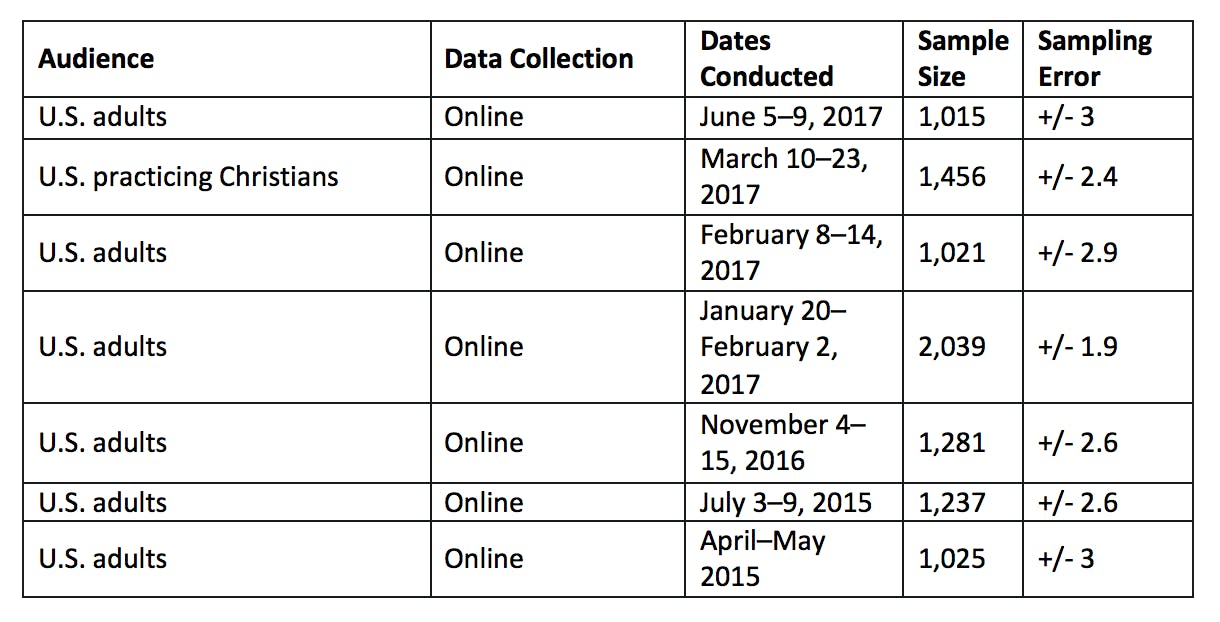
The term “post-truth” is now often used to describe the current political climate in the United States, in which reality is relative and even the facts are open to interpretation. In the feature story of the new, 2018 edition of Barna Trends—an annual collection summarizing a year’s worth of Barna’s major research studies and including analysis, interviews and infographics—the Barna team and other trusted experts identify cultural and spiritual reasons the world is no longer in agreement about anything.
In this sneak peek of Barna Trends 2018, let’s first examine the modern media dilemma.
Barna Access Plus
Strengthen your message, train your team and grow your church with cultural insights and practical resources, all in one place.
The Facts About “Fake News”
Barna Trends 2018 begins with an overview of the dwindling public confidence in institutions—especially, and very notably in 2017, the media. However, three in 10 U.S. adults (31%) say the primary source of the “fake news” problem most often lies in reader error—“misinterpretation or exaggeration of actual news on social media”—not factual mistakes in reporting itself. And it would seem there are plenty of chances for these social media mistakes: When asked what kind of news media people are most likely to share, social media posts tie with traditional reporter-written articles as the top response (25% each). Though a plurality (36%) says they verify reports by comparing to multiple sources, the tendency to share social media posts as news points to a preference for more salacious, opinion-forward headlines and reporting. At the least, it allows opportunity to perpetuate it; a plurality (38%) never corrects misinformation they see on social media.

As much as the media has been called into question of late, reporters still top the list as credible sources of news (39%)—but are followed closely by the self: Nearly a third (32%) says they trust nobody, only their own instincts. The next response is friends, family members or peers (27%), revealing a propensity to turn inward or to one’s tribe for truth when outside authorities are no longer seen as reliable.

Get more thoughts on the state of journalism in interviews with Sarah Pulliam Bailey, Tom Krattenmaker and more, featured in Barna Trends 2018.
Trump’s Trust Problem
This echo-chamber effect in media consumption might also be a reason that, in the 2016 election, groups already compelled to vote for President Trump brushed off many of the negative stories about him, yet were enraged by headlines about Hillary Clinton—and vice versa. Trump is, undoubtedly, a central figure in this discussion, and his fascination with and hostility toward the press is well-documented (more recently, in his tweets about giving out awards for “the most dishonest and corrupt media”). As a result, Barna Trends 2018 focuses at-length on views of Trump’s policies, personality and performance in his inaugural year in office.
Despite Trump’s barbs about journalists, one in five U.S. adults (21%) says a free press is something that makes America great (to borrow phrasing from Trump), and they don’t see Trump as a bastion of truth himself. As of a mid-2017 Barna survey, more than half of Americans (56%) say they do not trust Trump, and one-third (33%) doesn’t trust any of his cabinet members and key officials. These averages, of course, belie stark contrasts when looking at political ideology, party affiliation, generation and faith segment, as Trump’s supporters generally remain positive. (Read more about the process and limits of political polling from Barna’s senior vice president of research.)
Jeremy Courtney, Mark Batterson, Dr. John M. Perkins, Mac Pier and more offer thoughts on the current political climate in exclusive interviews for Barna Trends 2018.
The Sacred Self
Media voices aren’t the only ones facing a crisis of credibility; Barna Trends 2018 concludes with sobering data that shows the areas in which Christianity’s influence is waning. Just about one-third of Americans (36%) strongly believes churches “have their best interest at heart,” and one in four (25%) does not put stock in pastors’ insights on the issues of the day.
Meanwhile, truth is increasingly regarded as something felt, or relative (44%), rather than something known, or absolute (35%)—a shift reflected in other new religion surveys covered in Barna Trends 2018. For example, many Americans (56%), especially Millennials (64%), don’t feel that any one religious text has a monopoly on truth, but that they are all different expressions of the same spiritual message. As a result, some spiritually inclined Americans seek faith outside of the local church context, as is the case with “the spiritual but not religious” or those who “love Jesus but not the church,” individuals that Barna grouped and studied for the first time in 2017.

About the Research
About the Research
The statistics and data in Barna Trends 2018 have been drawn from a series of national public opinion surveys conducted by Barna Group. Minimal statistical weighting was used to calibrate the sample to known population percentages in relation to demographic variables. Methodology for the research in the excerpt above is as follows:

© Barna Group, 2018.
About Barna
Since 1984, Barna Group has conducted more than two million interviews over the course of thousands of studies and has become a go-to source for insights about faith, culture, leadership, vocation and generations. Barna is a private, non-partisan, for-profit organization.
Related Posts

Americans Are Most Likely to Base Truth on Feelings
- Culture
-
From the Archives

10 Facts About Faith in American Cities
- Culture
-
From the Archives
Lead with Insight
Strengthen your message, train your team and grow your church with cultural insights and practical resources, all in one place.
Get Barna in your inbox
Subscribe to Barna’s free newsletters for the latest data and insights to navigate today’s most complex issues.





